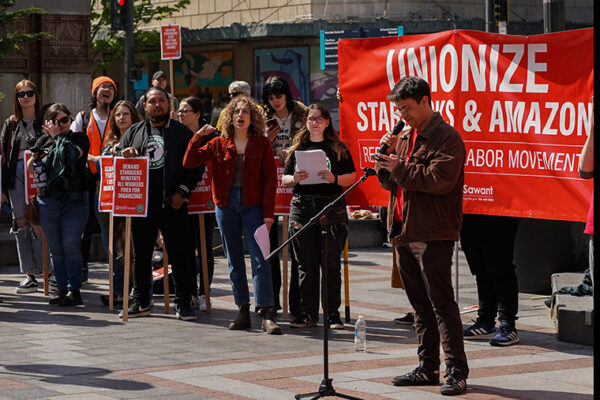In an unprecedented move, unionized auto workers from General Motors, Ford and Chrysler owner Stellantis have joined forces to pressure Detroit’s big three automakers into increasing wages and benefits.

Even before the United Auto Workers (UAW) walked out Sept. 15, 2023 had already been unofficially named “the summer of strikes” for the unusually high level of labor activity. That’s because the persistently tight labor market combined with growing frustration over wage inequality has encouraged workers across industries to fight back and organize, according to Jake Rosenfeld, an expert on labor unions and a professor of sociology in Arts & Sciences at Washington University in St. Louis.
Also fueling the trend: Support for unions is higher than it has been in nearly six decades. In a 2022 analysis for The Washington Post, Rosenfeld wrote, “The recent successes of organizing drives at Starbucks, Amazon, Trader Joe’s and elsewhere suggest unions are capitalizing on worker support and finding ways to overcome the barriers that have diminished their ranks in recent decades. The rising popularity of unions will probably bolster these efforts. After all, labor organizing is impossible if there is no support for unions.”
With 13,000 auto workers in Missouri, Michigan and Ohio now on strike and others positioned to join them — including the union that represents autoworkers in Canada — the outcome of the UAW strike has the potential to impact future labor activity in the U.S., according to Rosenfeld, author of “You’re Paid What You’re Worth and Other Myths of the Modern Economy” and “What Unions No Longer Do.”
“Past research has shown that successful strikes can prove contagious and spread to other industries,” he said. “But the strikes have to be successful. It’s important to keep in mind we have ongoing strikes out west in Los Angeles with writers, screen actors and hotel workers that unions are also watching closely. If these strikes fail, that could dampen enthusiasm for further action just as quickly as a successful strike could increase enthusiasm.”
Below, Rosenfeld answers some of the common questions associated with the UAW strike.
Some have criticized the UAW’s demands as unreasonable. What’s your take?
It’s hard to know without being privy to the inside negotiations which of the union’s demands are bargaining chips and which are non-negotiable. Certainly, they are asking for a lot, but the broader context here is important. For decades, the companies have eroded autoworkers’ contracts, claiming doing so was necessary to maintain competitiveness and — in the aftermath of the Great Recession — to stay afloat financially. The union is trying to claw back a lot that was lost during those lean years now that the companies are enjoying record profits.
Do you think the current political environment has emboldened the auto workers?
I think broader public sentiment certainly buttresses the union’s case here. But probably more importantly is the economic environment: You’ve got record-low unemployment combined with an auto sector that is thriving, making it the perfect opportunity for auto workers to ask for a share in the revenue.
Will the work stoppage be long? What factors could affect that?
Nobody wants a long strike, so certainly the incentives — and increasing pressures — are on both sides to find a deal. It does seem that both sides are actively negotiating, which hopefully indicates that they can find a solution in relatively short order.
Last December, President Joe Biden and his administration played a role in preventing a railroad strike that would have devastated the economy. How might the Biden administration get involved in this strike?
Whether or not the Biden administration gets involved likely depends on the duration of the strike and the broader devastation a long strike could play in key — politically speaking — state economies. But for now, what I’d expect is that the administration lets this play out while offering mediation as needed and requested by both sides.


